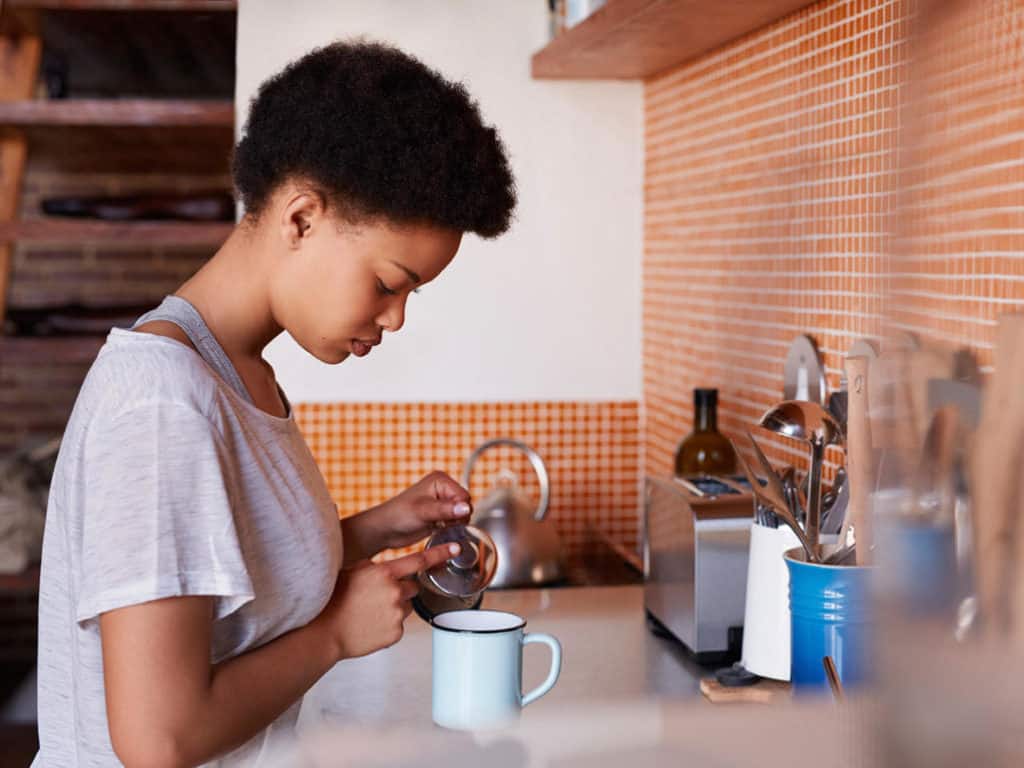
Table of Contents
As an expecting mother, you probably have already been handed down a list of foods to eat and another, even longer list of foods to avoid. Coffee or any other based-caffeine-drinks that make it to the list of foods that should be avoided in pregnancy and as a woman in love with their morning coffee pre-pregnancy, you might hate to have found yourself in this spot.
You might already also be wondering if there could be any loopholes to this rule or if you could perhaps just cut down coffee and not curb the intake completely. Unfortunately, there is no definite answer to how much coffee or caffeine consumption is safe during pregnancy, there are only some recommendations; but for everything else, we are here to help!
In this blog, we will cover everything you need to know about a safe limit for caffeine consumption; how much coffee is safe, how to curb the cravings and what to do to avoid the not-so-obvious sources of caffeine during pregnancy.
Coffee During Pregnancy: How Much Coffee Is Safe During Pregnancy?
Is coffee ok during pregnancy? As per the American College of Obstetricians and Gynecologists (ACOG), pregnant women are advised to cut down their caffeine intake to “less than 200 mg per day.” In layman’s terms, 200 mg is about one 11-ounce cup of coffee in one full day.
Is Coffee Safe During Pregnancy: Does Caffeine Affect The Fetus?
Pregnant women are advised to avoid caffeine during pregnancy because caffeine can cross through the placenta and enter the amniotic fluid which is supposed to nourish and nurture a baby. Once the caffeine reaches amniotic fluid, it also subsequently reaches the baby’s bloodstream and could expose the baby to caffeine, causing harm to the fetus.
Though mild caffeine intake (less than 200 mg), as mentioned, does not cause harm to the baby, a greater intake can cause some major harm to the developing fetus. Though researchers are still trying to determine all the probable issues, it has already been established in a study that mothers who consume more than 300 mg of caffeine a day or more than one 11-ounce cup of coffee in one full day, are more likely to give birth to babies small for their gestational age.
Besides, since caffeine is proven to give you a ‘kick’ and to raise your BP as well as your heart rate, it is best to avoid the stimulant during pregnancy. As a pregnant woman, since your body’s ability to break down foods, including caffeine is lowered, consumption of too much caffeine can also cause a jittery feeling, cause increased heartburn by aggravating digestion acids, and lead to insomnia.
Fun fact: For a woman who is not pregnant versus a woman who is pregnant, the ability of a pregnant woman’s body to steer clear of caffeine from the bloodstream will take twice to three times as compared to the non-pregnant woman! This obviously also means that since the caffeine stays in the blood longer, more caffeine crosses the placenta and reaches the baby.
Coffee During Pregnancy - Reference Chat: Coffee Amount In Coffee Cups
Here’s a quick reference chart to help you understand the amount of caffeine present in varied kinds of cups of coffee:
| Coffee Type | Coffee Amount | Caffeine Amount |
| Coffee, Generic Brewed | 8 oz | 95-200 mg |
| Coffee, Starbucks Brewed | 12 oz | 12 oz 240 mg |
| Coffee, Dunkin’ Donuts Brewed | 16 oz | 16 oz 211 mg |
| Caffé latte, Misto, or Cappuccino (Starbucks) | 16 oz 12 oz | 150 mg 75 mg |
| Espresso, Generic | 1 oz (1 shot) | 64 mg |
| Espresso, Starbucks | 1 oz (1 shot) | 75 mg |
| Instant Coffee, Generic | 1 tsp (granules) | 31 mg |
| Decaffeinated Coffee, Generic | 8 oz | 2 mg |
Coffee During Pregnancy: Which Beverages And Foods Contain Caffeine
Coffee, of course, is the primary and most obvious source of caffeine which should be avoided at all costs. Apart from coffee, certain other foods also have high levels of caffeine, albeit in lower strengths like energy drinks, carbonated drinks like coke, coffee-flavored ice cream, tea, energy drinks like red bull, and even some over the counter drugs sold to cure common colds and headaches.
Over-the-counter pills are anyway recommended to be avoided during the pregnancy and owing to the presence of caffeine in some, it is advised to always read the label very carefully if at all you happen to take it. As well as consult your OBGYN prior to starting any medications during pregnancy.
As for pure coffee, the amount of caffeine will vary greatly based on the type of bean used as well as the technique used to brew your cup of coffee.
Coffee During Pregnancy - Reference Chat: Coffee Amount Present In Foods
Drink Type | Coffee Amount | Caffeine Amount |
Black tea, brewed | 8 oz | 47 mg |
Green tea, brewed | 8 oz | 25 mg |
Black tea, decaffeinated | 8 oz | 2 mg |
Starbucks Tazo Chai Tea latte | 16 oz | 95 mg |
Instant tea, unsweetened | 1 tsp powder | 26 mg |
Snapple | 16 oz | 42 mg |
Lipton Brisk Iced Tea | 12 oz | 5 mg |
Coke | 12 oz | 47 mg |
Diet Coke | 12 oz | 47 mg |
Pepsi | 12 oz | 38 mg |
Diet Pepsi | 12 oz | 36 mg |
Jolt Cola | 12 oz | 72 mg |
Mountain Dew | 12 oz | 54 mg |
7-Up | 12 oz | 0 mg |
Sierra Mist | 12 oz | 0 mg |
Sprite | 12 oz | 0 mg |
Red Bull | 8.3 oz | 77 mg |
5-Hour Energy | 2 oz | 138 mg |
Desserts | ||
Dark chocolate (with 70-85 percent cacao solids) | 1 oz | 23 mg |
Milk chocolate | 1.55 oz | 9 mg |
Coffee ice cream | 8 oz | 2 mg |
Frozen yogurt | 8 oz | 2 mg |
Hot Cocoa | 8 oz | 8-12 mg |
Chocolate chips, semisweet | 4 oz | 53 mg |
Chocolate milk | 8 oz | 5-8 mg |
Coffee During Pregnancy - Tips To Curb The Caffeine Craving During Pregnancy
Feeling groggy at the thought of not being able to drink coffee? You like it or not, your doctor will recommend you to curb or at least lower your caffeine consumption during pregnancy. To help you achieve the goal of a safe pregnancy, lowering your maternal caffeine consumption is imperative.
Drinking Coffee During Pregnancy - Tips To Help You Lower Or Curb Caffeine
- Though most women typically start feeling everted to caffeine as a side effect of morning sickness, if you are one of those mommas who still finds herself yearning for that cup, try resorting to a decaf coffee, to begin with.
- You could also try spiking decaf powder with a small percentage of caffeinated coffee for that ‘kick’ which might be too difficult to let go of in the initial days.
- If you are using ground coffee or tea leaves, do not brew them for too long. In fact, letting a tea bag sit in the water for under one minute, instead of the regular 3-5 minutes can reduce the intensity of caffeine by half.
Coffee During Pregnancy FAQs
1) Is using a caffeine-based body lotion safe during pregnancy?
2) Are there any benefits of having caffeine during pregnancy?
3) Do caffeine-based drinks affect iron absorption in women during pregnancy?
4) Can caffeine cause miscarriages?
5) Is caffeine-free coffee OK during pregnancy?
Reviewed By-

Brandi Nicole, Lactation Consultant
Brandi Nicole is a pediatric nurse, a postpartum doula, and an international board-certified lactation consultant. She is a proud member of the International Lactation Consultant Association, the United States Lactation Consultant Association, and the Bay Area Lactation Associates.
On behalf of the editorial team at Parenthoodbliss, we follow strict reporting guidelines and only use credible sources, along with peer-reviewed studies, academic research institutions, and highly respected health organizations. To learn about how we maintain content accurate and up-to-date by reading our medical review and editorial policy.
Join 1000+ Parents Who Get Our Weekly Bliss!

Get expert parenting tips, baby product guides, and wellness advice—delivered straight to your inbox. No spam, just real, research-backed support on your parenting journey



